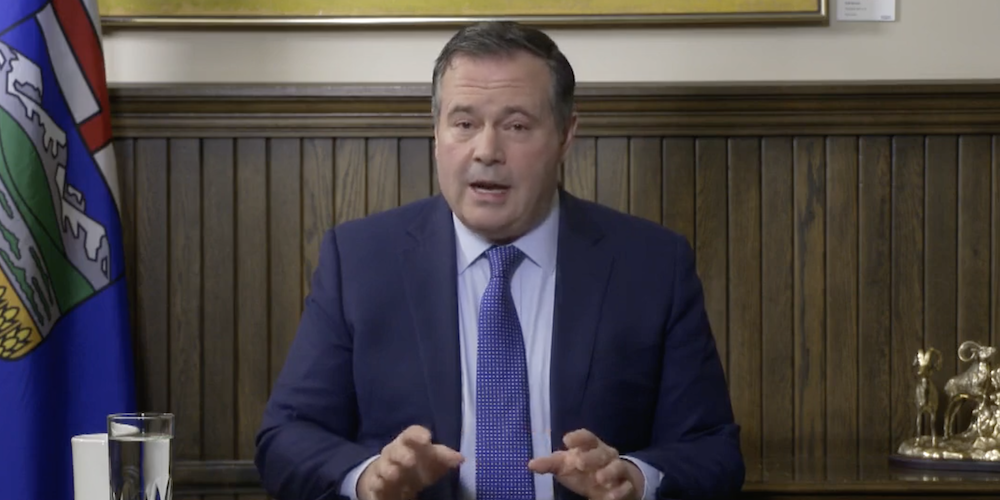Jason Kenney and his allies in the United Conservative Party (UCP) are noisily celebrating the Alberta Court of Appeal’s opinion Wednesday, May 11 that the federal government’s environmental assessment law is unconstitutional, and who can blame them?
The 4-1 opinion in the Alberta government’s reference case on the former Bill C-69, now the Impact Assessment Act, doesn’t actually change anything, and its chance of surviving intact at the Supreme Court of Canada, which the federal government vowed yesterday will be its next destination, is surely no better than 50/50, perhaps quite a bit worse.
So as a severely normal Canadian from any province, including Alberta, you might think Premier Kenney’s assessment that the judicial opinion is “an historic victory,” and the chorus of whoopies emanating from his government’s inner circle, are a just little more cheerful than the situation warrants.
But look at it from their perspective. What else do they have to celebrate?
The premier himself may be on the threshold of a historic defeat in the leadership referendum vote now being conducted by his party – a couple of credible estimates by veteran political observers put the percentage of votes his continued leadership is likely to attain in the low to mid 40s!
His UCP is bitterly divided over its response to COVID, the influence of its lunatic rightward fringe, and Kenney’s leadership itself. That’s not going to change if he loses his party’s confidence. There’s been so much talk of electoral shenanigans, past and present, that if he does win the referendum on his leadership no one’s going to believe he did so honestly.
Even some cabinet ministers are said to have made no effort to sell new memberships to Kenney supporters in their own ridings. Meanwhile, new memberships in places his rival Brian Jean is popular are said to be selling much better. The government seems to face a new scandal in the media almost daily.
A new poll is rumoured to show the NDP Opposition increasing its lead over the UCP.
So, yeah, why not celebrate the appeal court’s ruling and party like it’s 2019? As they say: Eat, drink and be merry, for ya’ll know what happens tomorrow!
The majority opinion does say, “This legislative scheme allows the federal government to essentially render worthless the natural resources of individual provinces by stopping their development,” and concludes that, if upheld, it would “permanently alter the division of powers and forever place provincial governments in an economic chokehold controlled by the federal government.”
So what the hell, Kenney couldn’t have explained his hyperbolic version of reality any better than that, and the court’s opinion might even send a few wavering votes his way – although it’ll only be a few, since all votes have to be returned to the party by Thursday, May 12 in order to be valid. The results of the vote are supposed to be made public a week from Thursday, though why they’ll take that long to count is an interesting question.
When Alberta Environment Minister Jason Nixon says, “although this is technically an opinion and not a decision of the Court, we consider it definitive of determining the constitutionality of the IAA and thus binding in Alberta,” he is whistling past the graveyard.
Federal Environment Minister Stephen Guilbeault and Justice Minister David Lametti said in a statement that “it is important to note that the decision of the Alberta Court of Appeal is advisory in nature and that the Impact Assessment Act and regulations remain in force.”
As to how the two federal ministers expect the act to fare before the Supreme Court, they said Ottawa “worked extensively with legal experts and provincial and territorial governments to develop the Impact Assessment Act. We are confident the Impact Assessment Act is constitutional. …”
Well, someone is bound to say Guilbeault and Lametti are whistling past the graveyard, too, so all of us armchair litigators will just have to wait to see what the Supremes do.
In the meantime, here are a few preliminary thoughts from a couple of real legal scholars with some expertise in this area, who were bold enough to take to Twitter about it last night.
“I have now worked through both opinions,” said University of Calgary emeritus professor in law Nigel Bankes, referring to both the majority opinion and the dissent by Madam Justice Sheila Greckol. “I think that Justice Greckol’s opinion is excellent and I expect it to carry the day in the SCC. I think that she shows that the majority has created a straw person of massive federal overreach which she then proceeds to demolish.”
“What will the SCC decide,” asked U of C law professor and legal commentator Martin Z. Olszynski. “Hard to say, but hard to imagine they’d endorse this in its entirety.”
The majority opinion, he said in a thread that starts here, is rife with “extra-judicial reasoning that certainly doesn’t add to the legal analysis and probably distracts from it.”
“It’s not for the courts to decide how much env’l harm gov’ts may tolerate,” he observed elsewhere in his comments. “That is a political decision for which gov’ts are held accountable. This opinion [equals] judicial determination of how much harm the fed must tolerate, even when it’s squarely in their wheelhouse (eg fisheries).”
As for Nixon’s bluster, Olszynski observed, addressing the provincial minister: “Alas, it doesn’t matter what you think or consider – the IAA applies to private proponents. If they’re bullish on the ABCA majority being upheld, then by all means they can force a confrontation. If not, I reckon they won’t want to risk losing the next 1-2 yrs of assessment time.”
So stay calm everyone. Whatever you hope for, this isn’t a done deal.
And if you think you’ll be ill if you hear the phrase “the no-more pipelines law” one more time, I’m sorry to have to say you’re just going to have to be strong.




